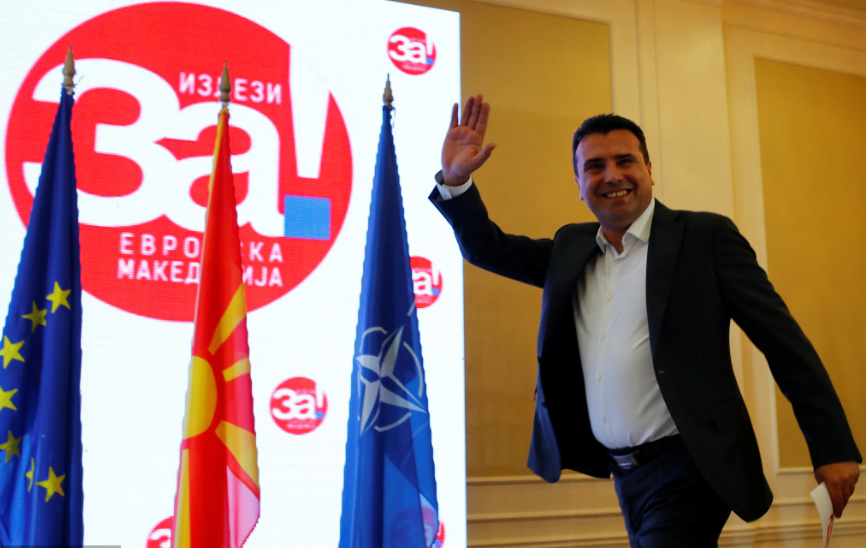
Macedonian Prime Minister Zoran Zaev arrives at a news conference after a referendum on changing the country's name in Skopje, Macedonia, September 30, 2018. (Photo: VCG )
Citizens of Macedonia, a small Balkan country, voted in a referendum on Sunday over the country's name.
It was part of a deal reached in June between the Greek and Macedonian governments attempting to overcome the dispute, which has not only hampered relations, but has affected Macedonia's future. That included Macedonia's memberships to NATO and the European Union (EU). Something that the population of this country strongly supports.
But in order for that to happen, the name dispute with Greece has to be resolved. According to the agreement between Macedonia and Greece, Macedonia will have to change its name to the Republic of North Macedonia, but a referendum on the issue did not go according to plan.
To make the referendum valid, it needed more than 50 percent of voters to cast their ballots. However, it was quickly apparent that things did not develop how the government wanted and expected.
It was a surprise when the first turnout figures began to emerge. By the end of the day, the numbers showed that only about 34 percent of Macedonian voters actually went to go to the polls, while over 91 percent of them supported a name change.
Soon after the first preliminary results came out and the trend was apparently set, Prime Minister Zoran Zaev engaged in damage control, by vowing to continue to fight for the acceptance of the referendum results despite the turnout, and focused on the fact that more than 90 percent of those who voted, supported the name change.
At a press conference that was held just an hour after the polls closed, PM Zaev called on the opposition to support the Prespa deal on the name change, regardless of the fact that, by the letter of the law, referendum had failed.
"I expect lawmakers from the opposition party to respect the democratic decision of the majority among those who voted, otherwise, there is no other way, we'll need to use the other democratic instrument and that means early parliamentary elections soon." PM Zaev said.
The low turnout was a major blow to the government, but a resounding success for the opposition. They see the result of this referendum as a major failure for the ruling party, as Hristijan Mickovski, the leader of biggest opposition party the VMRO - DPMNE, said at a press conference at his party's HQ.
"The government lost its legitimacy. The only thing that is left now for them is to accept the will of the people. This message from the people should be respected by the PM, the government, the parliament, all political parties. The failure of the referendum is the direct responsibility of Zoran Zaev, the government and nobody else," Mr. Mickovski said.
Voice of the people
While politicians were holding press conferences, hundreds of Skopje's citizens gathered in front of the Parliament of Macedonia in the center of capital Skopje.
They came to celebrate the referendum's failure, and they were happy because they rejected the deal with Greece, which was signed by the current Macedonian government, simply by boycotting the vote.
However, because more than 90 percent of those who cast their ballots voted for the name change, the government's position is to accept that result and to continue to pursue with the name change.
Earlier in the day, several voters at one of the voting stations in Skopje told us that it was clear that the government has the support of those who voted. Snezana Novovic Milevska was one of them.
"I'm trying to be an optimist." Snezana said, “I hope for the better, particularly for the young. We all are shopping for the better and we hope to get the EU membership. Not right now, but in the future.”
Her wishes for Macedonia to join the EU was shared by Naum, young man from Skopje.
"I expect that country's name to be changed." Naum said. "I think that after the referendum, things will change for the better in this country and we'll enter the EU. The EU membership for us means better salaries and better quality of life."
The biggest winner of the low turnout at the referendum was Macedonia's President Gjorge Ivanov, who publicly called for a boycott.
He even used the UN General Assembly stage a few days ago to express his dissatisfaction with the name-change agreement, but the political game between the supporters and opponents of the name change is far from over.
Now it is up to the parliament to decide what will happen next: Should they proceed with the acceptance of the Prespa Agreement or go to snap elections.


